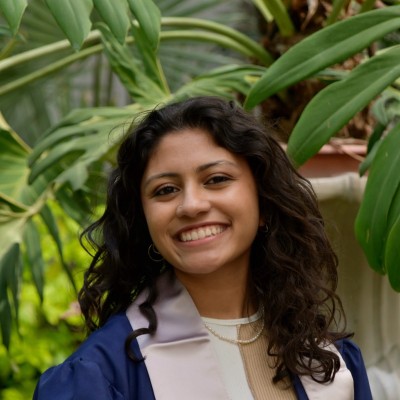In this story from the College of Liberal Arts and Sciences, Arissa Khan tells about her work as an undergraduate student researcher on the Observing Cusp High-altitude Reconnection and Electrodynamics (OCHRE) Mission.

Khan is a second-year undergraduate pursuing a BS in physics, BA in chemistry, and minors in math and philosophy .
What is the focus of your work?
The objective of the Observing Cusp High-altitude Reconnection and Electrodynamics (OCHRE) Mission is to investigate the cusp, a specific region in Earth's magnetosphere where the magnetic field lines converge. This region is very interesting, because it allows solar wind particles to enter the atmosphere and ionosphere and have some really interesting effects on space weather and Earth's magnetic environment. We are particularly interested in cusp reconnection, which happens on the far side of Earth as magnetic field lines on the sun-side break and reconnect on the night-side. Our mission is in tandem with the TRACERS mission, and we are hoping to gather further data to supplement their work, as well as answer some of our own questions! Our focus has been on studying how this region's behavior changes and behaves through a series of instruments attached to a sounding rocket, which will be launched from Andøya, Norway. My specific work has largely been on the Langmuir Probes, which will be used to measure the plasma's density and temperature as a function of altitude during the rocket's flight.
Tell us about the broad impact you'd like it to have?
One broad impact I'd like our research to have is to help make satellite technology more reliable. Oftentimes, the unpredictable nature of the magnetosphere can take a toll on satellites and cause them to have to be replaced, often compromising communications. By having a better idea of how solar wind particles affect our ionosphere and electromagnetic environment, we can also build better, more reliable equipment to help improve communications globally.
Additionally, I'd like to have an impact as a researcher and scientist as well. Growing up, there weren't very many scientists who looked like me in our textbooks and readings. I'd like to have an impact on other young girls who may feel discouraged from pursuing science because of how male-dominated the field can be. I love what I do, and I know other people have a similar passion but have been discouraged from pursuing it solely because they may not feel like they "fit in" the field. I want to be an example of how anyone can do great science and truly belong.
What excites you about the research environment in the College of Liberal Arts and Sciences?
One of the things that excites me most about the research environment in CLAS is how genuinely passionate and open so many of the professors and researchers are. UIowa is a special place because of how sophisticated a lot of the research here is, and how dedicated so many of these people are to actually involving students in this work. Collaboration is truly valued over competition, and everyone has the mindset that great research is the product of many contributions. It's been a pleasure to be involved in this research and see how my small contribution has impacted the world around me. I strive to implement this mindset throughout my career and show how important collaboration is beyond academic institutions.
Any favorite things to do in Iowa City?
I love going out to Lake MacBride and hiking around the trails and enjoying the beautiful nature. I'm a very outdoorsy person and love to spend as much time outside as I can! I also love trying new foods in the Iowa City area.